Feeding your Afghan Hound puppy the right food can really shape how healthy and strong they turn out. Knowing what nutrients your puppy needs and how to prepare balanced meals sets the foundation for their lifelong health.
This guide gives you simple tips to help you make nutritious puppy food at home. No confusing steps or fancy skills required.
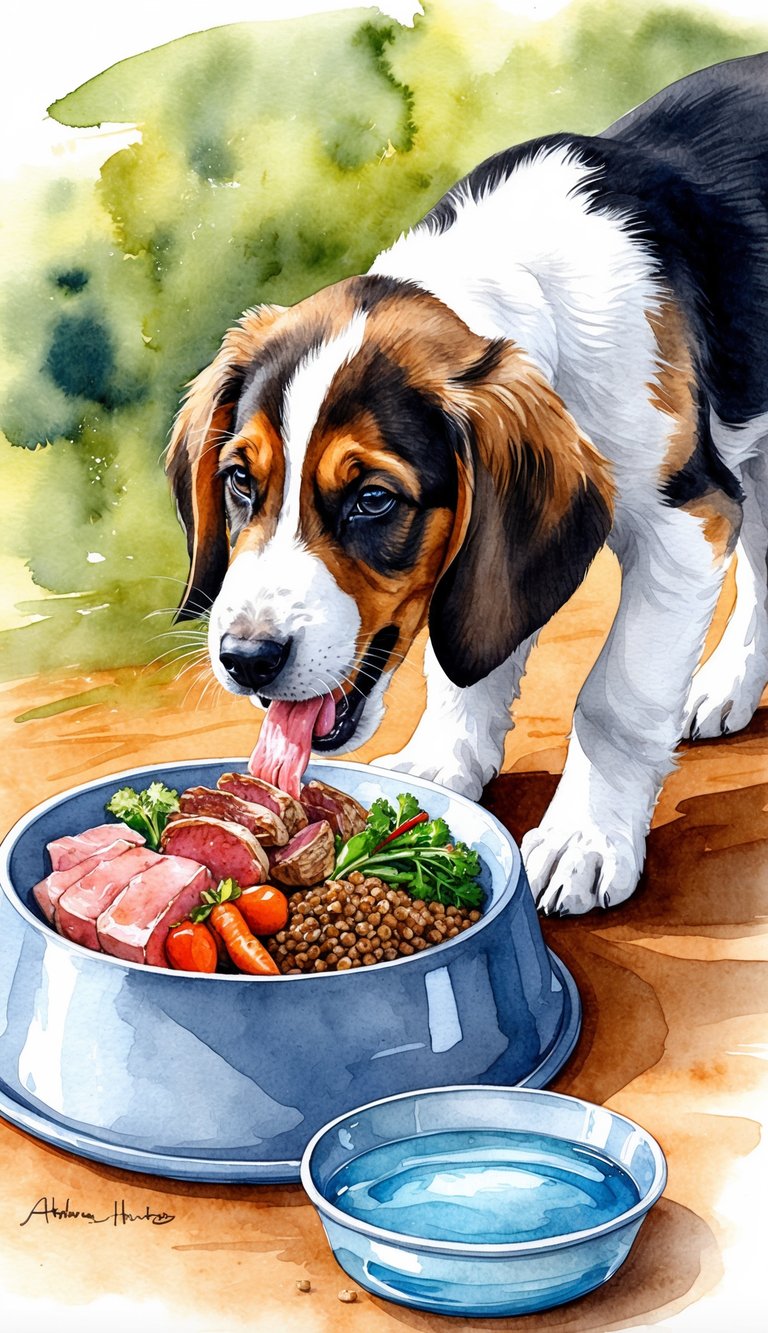
Each Afghan Hound puppy grows at its own pace and has a unique energy level. You’ll find out how to pick the best ingredients, dodge common mistakes, and tweak your puppy’s meals as they get older.
Key Takeaways
- Balanced nutrition supports healthy puppy development.
- Homemade meals need careful ingredient selection.
- Adjust the diet and check with your vet as your puppy grows.
Essential Nutritional Needs for Afghan Hound Puppies
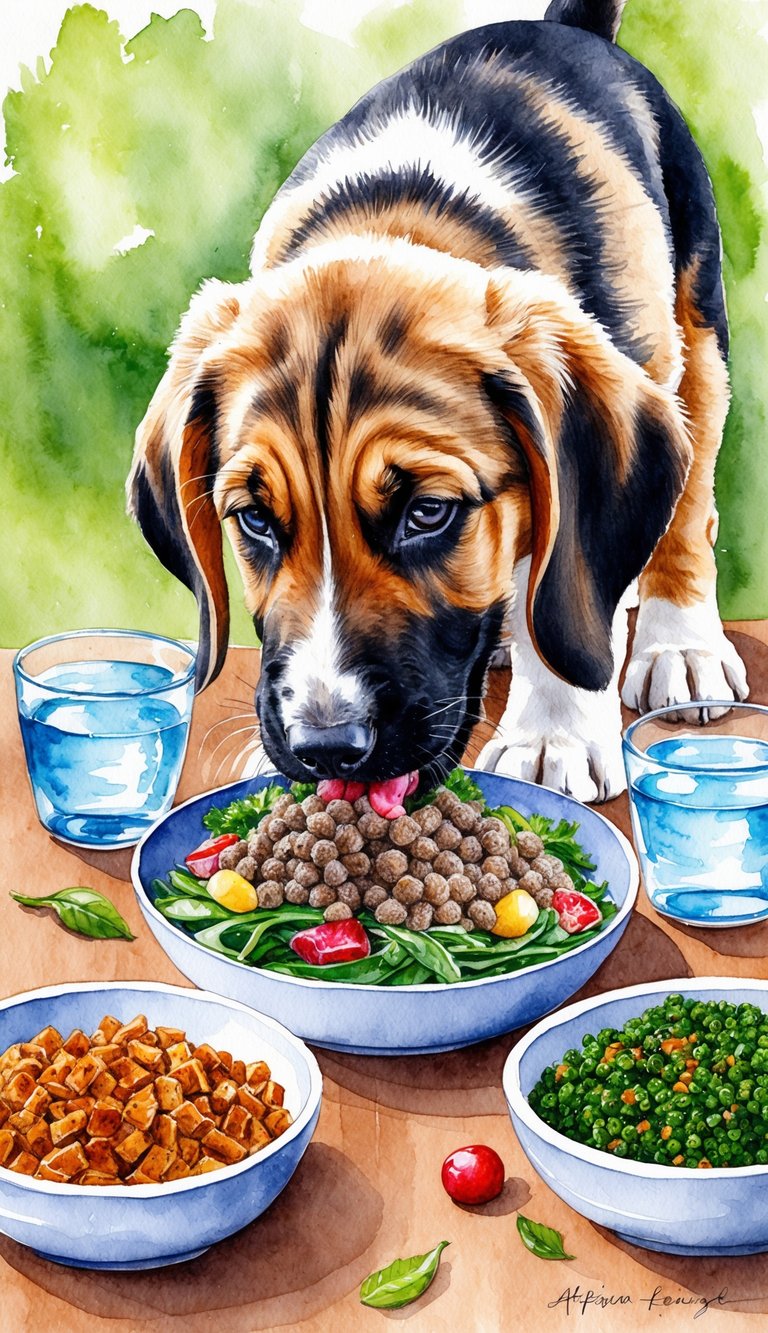
Afghan Hound puppies grow fast and need the right food to support their bones, muscles, and immune system. Feeding a balanced diet with the right nutrients sets them up for a healthy life.
Macronutrient Requirements
Afghan Hound puppies need food with the right amounts of protein, fat, and carbohydrates. Protein is the big one—it helps build muscle, skin, and fur. Go for animal-based proteins like chicken, beef, fish, or lamb. Try to keep protein at about 22-28% of the diet.
Fats give active puppies the energy they need. Healthy sources include chicken fat or fish oil. Shoot for 8-15% fat in the food. Carbohydrates like rice or sweet potatoes provide extra energy and fiber, but they shouldn’t take over the diet.
| Nutrient | Ideal Percentage in Diet |
|---|---|
| Protein | 22-28% |
| Fat | 8-15% |
| Carbohydrates | 20-30% |
Key Vitamins and Minerals
Your Afghan Hound puppy needs a range of vitamins and minerals every day. Here are some of the most important:
- Calcium and Phosphorus: Build strong bones and teeth. Keep the ratio around 1.2:1 to avoid bone problems.
- Vitamin D: Helps the body use calcium.
- Iron, Zinc, and Copper: Support blood health and strong immune function.
- Vitamins A, E, and C: Good for vision, skin, and the immune system.
Don’t overdo it with supplements—too much can throw things out of balance.
Hydration and Water Intake
Puppies can get dehydrated pretty quickly, so fresh water should always be within reach. Afghan Hound puppies, in particular, can get hot during play and might need more water than other breeds.
Tips for proper hydration:
- Refresh water bowls daily
- Clean bowls with soap and water often
- Watch for signs of dehydration: dry nose, tiredness, or sticky gums
Wet or home-cooked meals add a bit of moisture, but always keep a clean water bowl nearby. Afghan Hound puppies usually need about ½ to 1 ounce of water per pound of body weight daily. Give more on hot days or after exercise.
Selecting Ingredients for Homemade Puppy Food
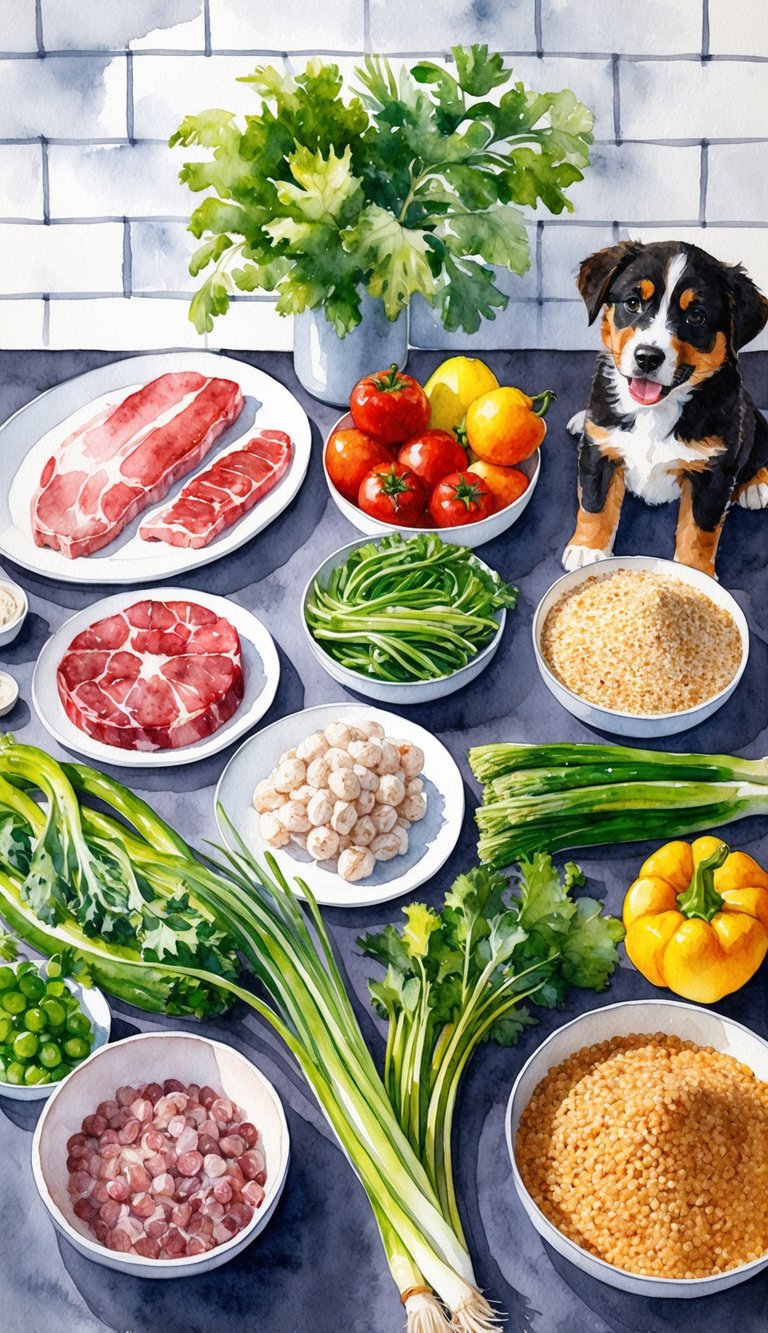
Choosing the right ingredients is key to helping your Afghan Hound puppy grow healthy and strong. Each ingredient should meet your puppy’s needs for protein, fats, vitamins, and minerals.
High-Quality Protein Sources
Protein lets your puppy build strong muscles and grow steadily. Good protein options include lean meats like chicken, turkey, and beef. Salmon and other fish offer extra omega-3s.
Eggs are safe too, but always cook them well. Organ meats like liver are packed with vitamins—just keep portions small.
Skip meats with salt, seasonings, or preservatives. Plain, cooked meats are best. If your puppy seems allergic, talk to your vet about trying something different like duck or venison.
| Protein Source | Preparation Tips | Notes |
|---|---|---|
| Chicken (boneless) | Boiled, no seasoning | Remove all bones |
| Beef (lean) | Boiled or baked | Trim visible fat |
| Salmon | Cooked, bones removed | Avoid raw fish |
| Eggs | Scrambled or boiled | Fully cooked |
Healthy Fats and Oils
Fats fuel your puppy and help keep their skin and coat looking good. Add small amounts of healthy fats to each meal. Use animal fats from meat, or plant oils like olive oil, flaxseed oil, or fish oil.
Omega-3 and omega-6 fatty acids help with inflammation and make fur soft. About a teaspoon of oil per meal usually works, but check with your vet for your puppy’s size.
Stay away from fats like butter, fried foods, or lard. Too much unhealthy fat can cause tummy trouble or weight gain. Stick to natural sources and measure what you add.
Fats to use:
- Salmon or fish oil
- Flaxseed oil
- Olive oil (extra virgin)
- Chicken fat (from boiled chicken)
Fats to avoid:
- Bacon grease
- Butter or margarine
- Processed oils with trans fats
Recommended Carbohydrates
Carbohydrates give puppies energy for play and learning. Good choices are plain white rice, brown rice, oats, and sweet potatoes. Cook all grains well to make them easy to digest.
Keep carbs as a small part of each meal. Afghan Hounds don’t need as many as some other breeds.
Potatoes and rice provide steady energy. Oats bring fiber for digestion. Don’t add salt, sugar, or sauces.
| Carbohydrate | Benefits | How to Prepare |
|---|---|---|
| Brown rice | Steady energy | Cooked, plain |
| Sweet potatoes | Vitamins & fiber | Boiled or baked |
| Oats | Digestive support | Fully cooked |
| Pumpkin | Soothes stomach | Plain, cooked |
Safe Fruits and Vegetables
Fruits and vegetables add vitamins, fiber, and antioxidants. Try carrots, spinach, green beans, blueberries, apples, and pumpkin. Cut everything into small pieces to avoid choking.
Never feed grapes, raisins, onions, garlic, or avocados—they’re toxic. Always remove apple seeds and cores.
Cooking veggies like carrots and green beans makes them easier to digest. A few blueberries or banana slices make a nice treat.
Sample safe vegetables:
- Carrots (cooked/steamed)
- Spinach (chopped, cooked)
- Green beans (cooked)
Sample safe fruits:
- Blueberries (fresh)
- Apples (no seeds or core)
- Bananas (sliced)
Preparing Balanced Meals for Growing Afghan Hounds
Afghan Hound puppies need the right nutrition for steady growth and strong bones and muscles. Setting proper portions, using safe prep methods, and storing food well keeps meals safe and healthy.
Meal Portions and Frequency
Feed your Afghan Hound puppy three to four times a day until they hit six months. After that, switch to twice a day. Afghan Hounds are lean, so too much food can cause weight gain.
Use this chart as a starting point:
| Age (months) | Meals per day | Portion size (cups, divided) |
|---|---|---|
| 2-4 | 4 | 1 to 1.5 |
| 4-6 | 3 | 2 to 2.5 |
| 6-12 | 2 | 2.5 to 3 |
Adjust portions based on activity, growth, and your vet’s advice.
Mixing and Cooking Methods
Start with lean proteins like chicken, turkey, or beef. Add cooked rice, sweet potatoes, or carrots for carbs.
Toss in some cooked veggies, like peas or green beans, and a bit of healthy fat such as olive oil.
Cooking Steps:
- Boil or bake meats (don’t use raw meat for puppies).
- Steam or boil vegetables until soft.
- Mix together equal parts protein and carbs, then add veggies and healthy fats.
- Skip salt, spices, onions, or garlic—they’re not safe for dogs.
Let food cool before serving. Serve at room temperature so your puppy doesn’t burn their mouth.
Food Storage and Safety
Store cooked puppy food in airtight containers in the fridge for up to three days. Freeze leftovers in small, single-serve portions for up to two months.
Label containers with the date so you know what’s fresh.
Thaw frozen food in the fridge overnight before serving. Don’t leave cooked food out for more than two hours—it’ll spoil. Wash hands, bowls, and utensils with soap and hot water after prepping meals.
Always check for mold, odd smells, or weird textures before feeding stored food.
Supplementing Your Puppy’s Diet
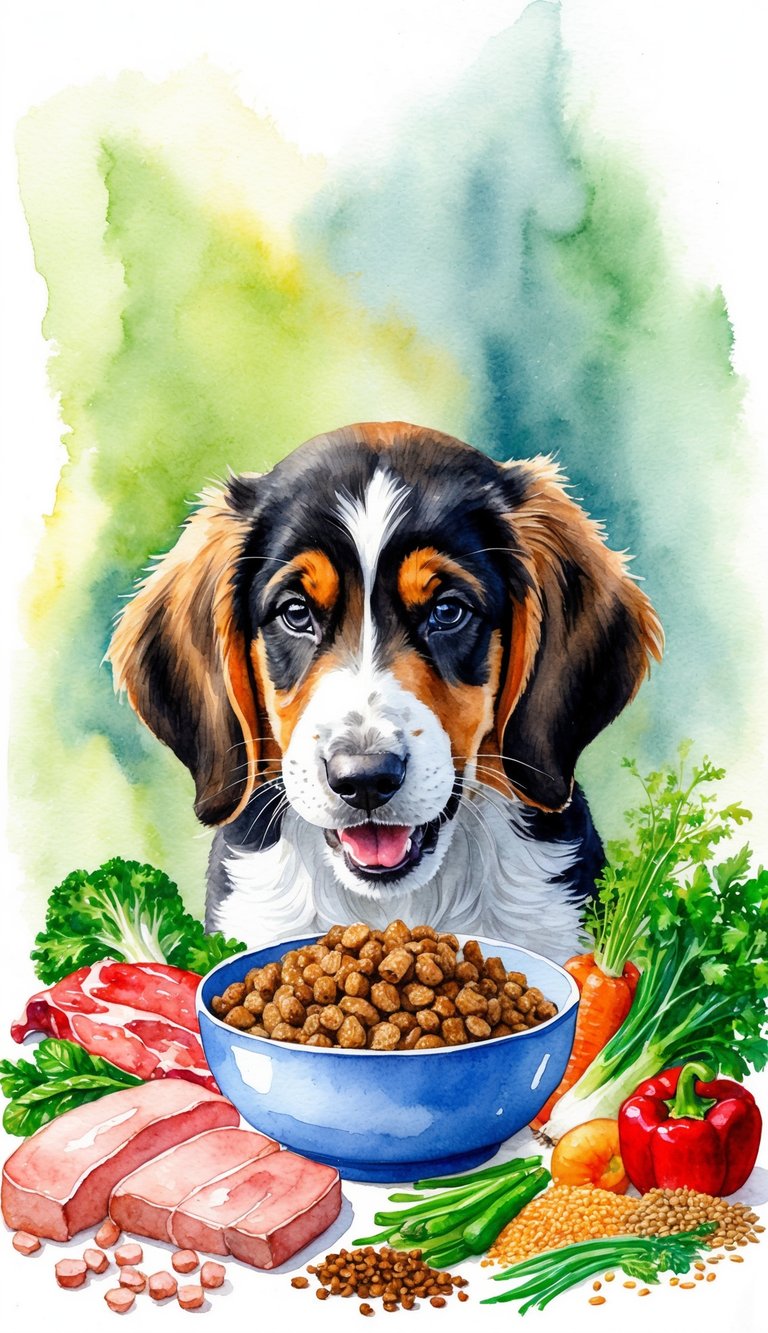
The right supplements can fill nutritional gaps, but the wrong ones—or the wrong amounts—can be risky. Always stick to veterinarian-approved products and keep an eye on key minerals like calcium and phosphorus.
Choosing Veterinary-Approved Supplements
Not every supplement is safe or helpful for puppies. It’s best to ask your vet before adding anything new. Most puppies get what they need from a balanced puppy food.
Some supplements your vet might recommend for Afghan Hound puppies:
- Omega-3 fatty acids for brain and skin health
- Probiotics for digestion
- Glucosamine for joint support in bigger breeds
Look for the AAFCO (Association of American Feed Control Officials) seal on the label—it means the product meets good standards. Avoid human vitamins and never guess the dose; too much can be dangerous for puppies.
Calcium and Phosphorus Balance
Large breeds like Afghan Hounds need the right balance of calcium and phosphorus for healthy bone growth. Too much or too little of either mineral can mess with bones and joints.
Most commercial puppy foods get this ratio right. If you’re making food at home, ask your vet if you need a mineral supplement.
The safe calcium to phosphorus ratio for puppies sits between 1:1 and 1.5:1. For reference:
| Nutrient | Amount per 1000 kcal (minimum) |
|---|---|
| Calcium | 2.0 grams |
| Phosphorus | 1.6 grams |
Don’t add extra calcium if your food already hits these numbers. If you notice limping or swollen joints, call your vet.
Common Mistakes to Avoid in Puppy Food Preparation
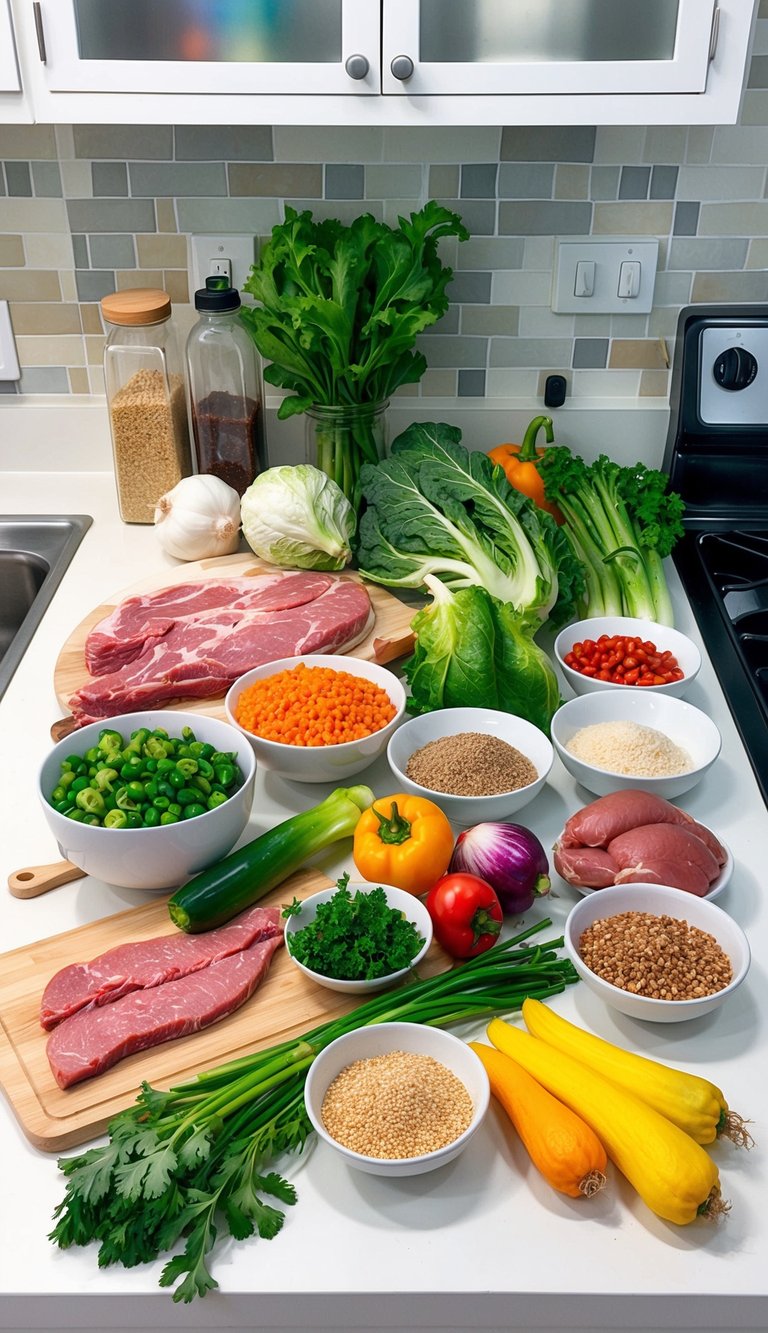
Mistakes with puppy food can really hurt your Afghan Hound’s health. Paying attention to ingredients and portions matters more than you might think.
Harmful Ingredients to Exclude
Some foods just aren’t safe for Afghan Hound puppies. Skip anything with chocolate, grapes, raisins, onions, or garlic.
Even small amounts can cause poisoning or organ damage. Salt, spices, and sugar are a no-go, too—puppies have delicate stomachs, and these can trigger digestive trouble.
Never give cooked bones, since they might splinter and cause choking or internal injuries. Watch out for artificial sweeteners like xylitol.
Just a tiny bit of xylitol could drop their blood sugar dangerously or even cause liver failure. Stick with whole, fresh foods and only add supplements your vet recommends.
Unsafe Foods Table
| Ingredient | Danger to Puppies |
|---|---|
| Chocolate | Toxic, can be fatal |
| Grapes/Raisins | Kidney failure |
| Onions/Garlic | Damages red blood cells |
| Xylitol | Liver failure, hypoglycemia |
| Cooked Bones | Choking, internal injury |
Risks of Improper Feeding
Feeding too much or too little affects your puppy’s health. Overfeeding can make them gain weight too fast, which stresses their bones and joints.
That can mean joint problems or obesity down the line. Not feeding enough leaves them tired and underdeveloped.
Your vet can help you get the portions right, so measure food carefully. Protein and fat levels matter, too—puppies need both for energy and growth.
Make sure meals are balanced, and tweak recipes as your pup grows. Always offer fresh water with every meal.
Dehydration sneaks up, especially with dry food. Clean bowls and utensils every time to keep bacteria away.
Tracking Growth and Adjusting Diet Over Time
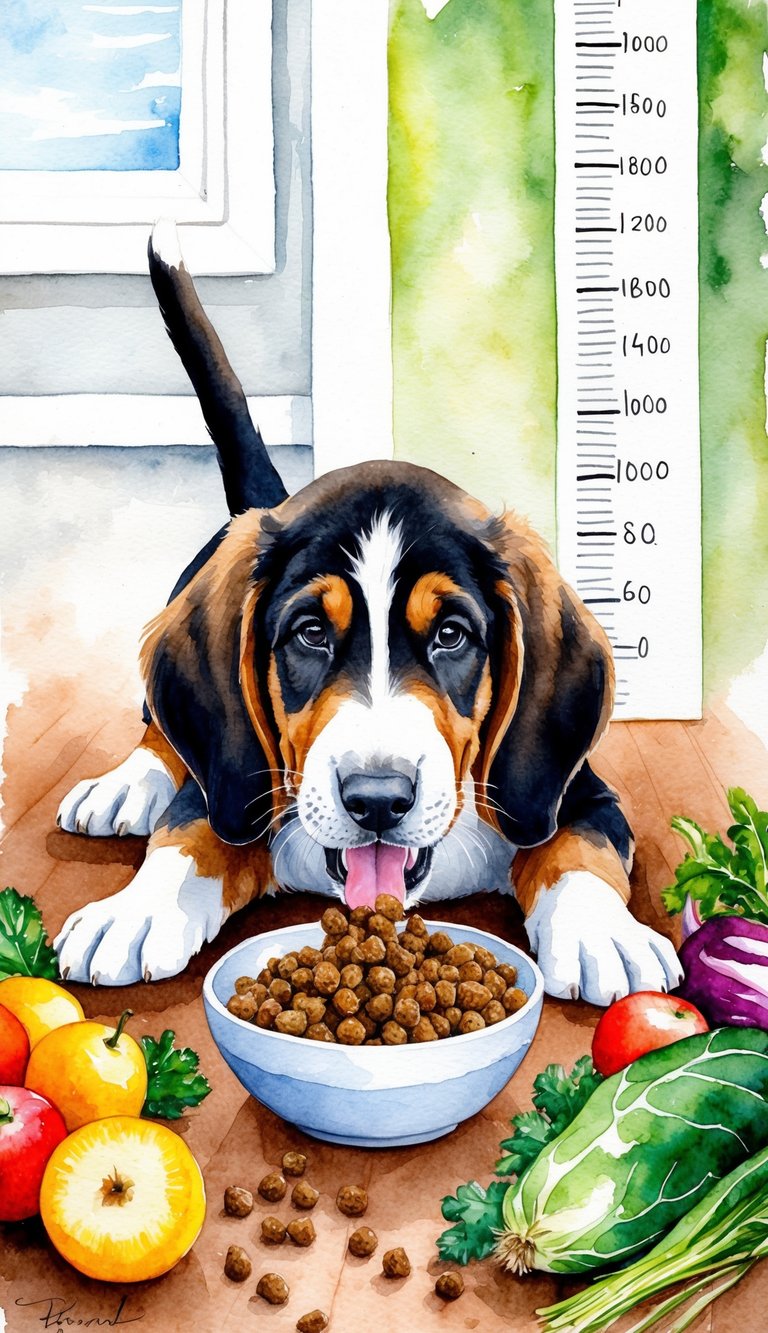
Afghan Hound puppies grow fast, and their diet needs change quickly. Keeping an eye on their weight and tweaking their meals helps them stay healthy.
Monitoring Weight and Development
Weigh your Afghan Hound puppy every week on a pet scale. Jot down the numbers in a notebook or on your phone.
Charting the results helps you spot any slowdowns or sudden jumps. Watch for signs like a shiny coat, clear eyes, and playful energy.
If your puppy seems tired or isn’t gaining weight, you might need to adjust their food or check for health issues.
Here’s a simple chart for average puppy weights:
| Age (Weeks) | Average Weight (lbs) |
|---|---|
| 8 | 15 – 20 |
| 12 | 23 – 28 |
| 16 | 32 – 40 |
| 24 | 48 – 60 |
If you notice rapid weight gain or frequent tummy troubles, it’s time to check with your vet.
When to Modify Nutritional Plans
Change your puppy’s diet as they grow or get more active. Growth spurts mean they’ll need more calories, but don’t overdo it—too much food can hurt their joints.
Switching from homemade to store-bought food (or the other way around) calls for a new feeding plan. If your vet spots issues like dry skin or weak bones, update the nutrient mix.
Adjust food portions if:
- Growth slows down
- Weight changes for no reason
- Energy levels drop
If your puppy starts turning down food or shows allergy signs, swap out ingredients and keep an eye on how they react. Add new foods one at a time, just to be safe.
Not sure what to do? Ask your vet—they’ll have the best advice for your pup.
Consulting Veterinarians for Personalized Guidance
A veterinarian really is your best bet when it comes to making puppy food for your Afghan Hound. Every puppy is unique, so a vet can help you adjust meals to match your dog’s age, size, and health.
Bring your puppy to the vet for regular check-ups. At each visit, your vet checks weight, growth, and overall health.
This helps spot nutrition problems before they become serious. Honestly, it’s just good peace of mind.
Your veterinarian can:
- Recommend the right amount of protein, fat, and carbs
- Identify food allergies or sensitivities
- Suggest key vitamins and minerals
- Help with any health conditions that need a special diet
When you visit, share details about your puppy’s behavior and eating habits. The more your vet knows, the better they can help.
If you’re thinking about changing your puppy’s food, ask your vet first. They’ll guide you on safe ingredient swaps and how much to serve.
| What To Ask Your Vet | Why It Matters |
|---|---|
| How much should my puppy eat daily? | Prevents overfeeding or underfeeding |
| Are there ingredients to avoid? | Reduces risk of allergies or illness |
| Should I add supplements? | Makes sure meals are balanced |



